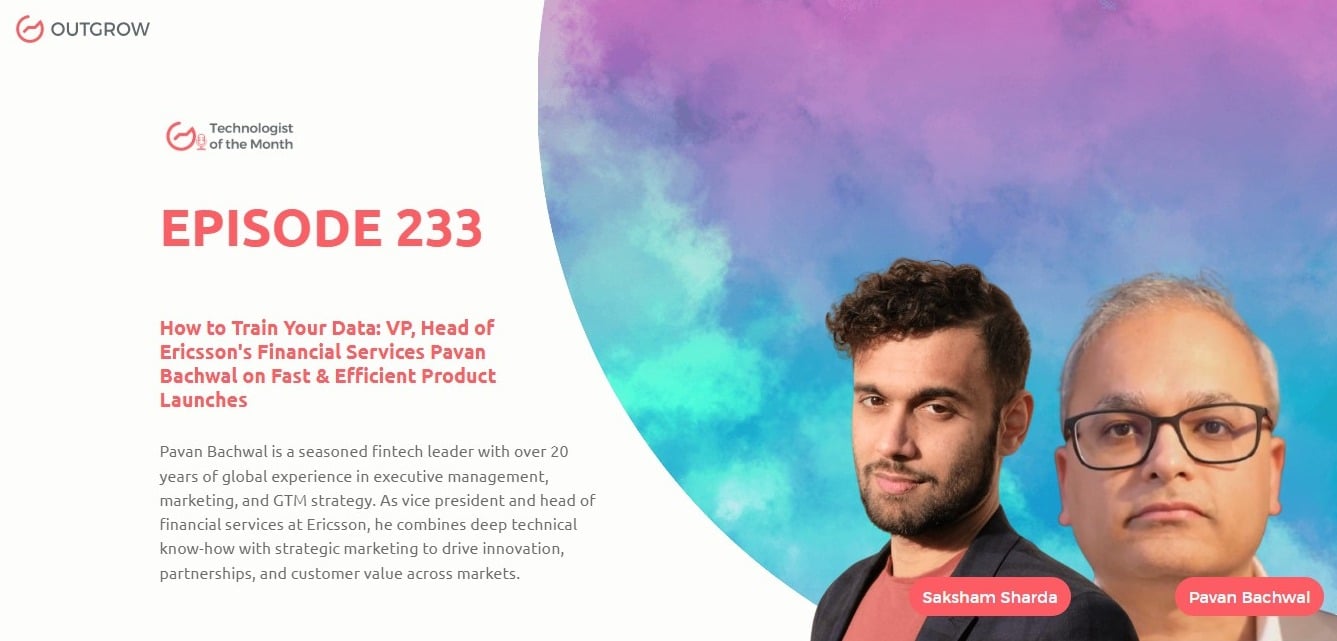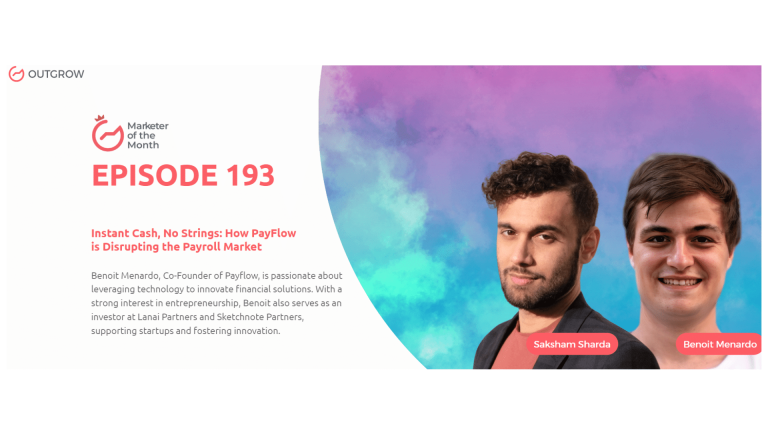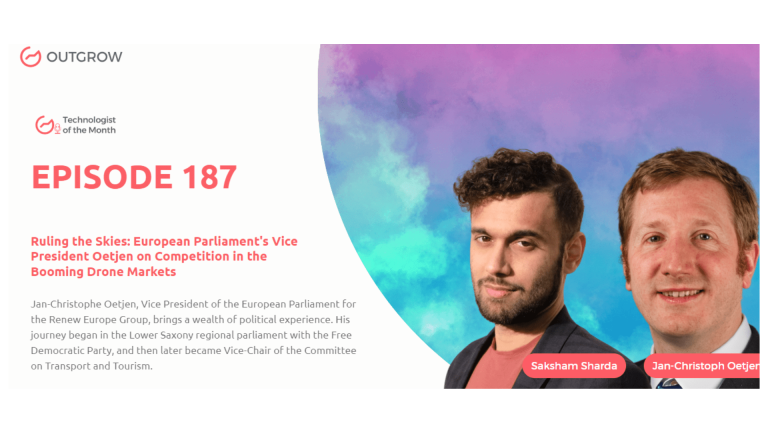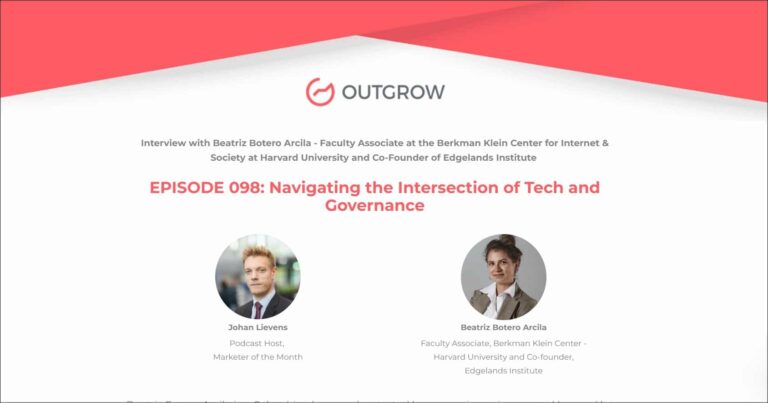Summarize with :
EPISODE 233: Marketer of the Month Podcast with Pavan Bachwal
Table of Contents
Hey there! Welcome to the Marketer Of The Month blog!
We recently interviewed Pavan Bachwal for our monthly podcast – ‘Marketer of the Month’! We had some amazing insightful conversations with Pavan and here’s what we discussed about-
1. Leveraging Transaction Data for Competitive Advantage – API usage and feature optimization.
2. Adapting African Mobile Money Success for Europe – Regulatory and market differences
3. Parental Control Innovation for European Markets – Family-focused financial services features.
4. Four Pillars of Robust Go-to-Market Strategy – Technology, people, organization, licensing.
5. Evolutionary vs Revolutionary Geographic Expansion – Stepwise growth over hockey stick dreams.
6. Future of FinTech Marketing Trends – AI, digital assets, and real-time transactions.
7. Compliance Requirements for European Deployment – GDPR, SAPA, SWIFT integrations.
About our host:
Dr. Saksham Sharda is the Chief Information Officer at Outgrow.co He specializes in data collection, analysis, filtering, and transfer by means of widgets and applets. Interactive, cultural, and trending widgets designed by him have been featured on TrendHunter, Alibaba, ProductHunt, New York Marketing Association, FactoryBerlin, Digimarcon Silicon Valley, and at The European Affiliate Summit.
About our guest:
Pavan Bachwal is a seasoned fintech leader with over 20 years of global experience in executive management, marketing, and GTM strategy. As vice president and head of financial services at Ericsson, he combines deep technical know-how with strategic marketing to drive innovation, partnerships, and customer value across markets.
How to Train Your Data: VP, Head of Ericsson’s Financial Services Pavan Bachwal on Fast & Efficient Product Launches
The Intro!
Saksham Sharda: Hi, everyone. Welcome to another episode of Outgrow’s Marketer of the Month. I’m your host, Dr. Saksham Sharda, and I’m the creative director at Outgrow. co. And for this month we are going to interview Pavan Bachwal, who is the VP of Head of Ericsson Financial Services at Ericsson.
Pavan Bachwal: Great to be here. Thank you.
Don’t have time to read? No problem, just watch the Podcast!
Challenge yourself with this trivia about the exciting topics Pavan Bachwal covered in the podcast.
Or you can just listen to it on Spotify!
The Rapid Fire Round!
Saksham Sharda: Okay. Alright, let’s start with the rapid-fire rounds. How long does it take you to get ready in the mornings?
Pavan Bachwal: 45 minutes.
Saksham Sharda: Favorite color?
Pavan Bachwal: Green.
Saksham Sharda: What time of day are you most inspired?
Pavan Bachwal: The evening.
Saksham Sharda: How many hours of sleep can you survive on?
Pavan Bachwal: Five.
Saksham Sharda: The city in which the best kiss of your life happened?
Pavan Bachwal: Mumbai.
Saksham Sharda: How do you relax?
Pavan Bachwal: I go for a stroll.
Saksham Sharda: How many cups of coffee do you drink per day?
Pavan Bachwal: Two.
Saksham Sharda: The most valuable skill you’ve learned in life?
Pavan Bachwal: Patience.
Saksham Sharda: Your favorite Netflix show.
Pavan Bachwal: Castaway.
Saksham Sharda: Are you an early riser or a night owl?
Pavan Bachwal: Night owl.
Saksham Sharda: One word. Description of your leadership style.
Pavan Bachwal: Trust.
Saksham Sharda: Coffee or tea to kickstart your day.
Pavan Bachwal: Coffee.
Saksham Sharda: Top priority in your daily schedule.
Pavan Bachwal: Getting things done.
Saksham Sharda: Ideal vacation spot for relaxation.
Pavan Bachwal: Beach.
The Big Questions!
Saksham Sharda: Alright, that was the end of the rapid-fire round. I’ll go into the longer questions, which you can answer as easily and time as you like. First one is, how do you approach market positioning for a platform like Ericsson’s Mobile Financial Services, especially when your customers range from telcos to banks and fintechs?
Pavan Bachwal: You see, financial services are a broad spectrum. Okay. When it comes to different users. Okay. When it comes to different providers and technology offerings, enablement vendors like ourselves. Okay. So from that point of view, if you look at the telecommunications operators, they might be wanting transfers, payments, remittance, buy now, later use cases. Okay. But if I then go to the segment of retailers, they’re focusing on potentially payments, cash back incentives, or other kinds of bonuses. Going towards banks that might want to kind of look into lending, saving, insurance, etcetera. So from that point of view, what Ericsson is doing is it’s trying to get one stack platform that can address the different verticals of customers, no matter a telecommunications company, no matter a retailer, no matter a bank, or a FinTech over the top player. Okay. And that is how we try to position the different capabilities of the platform to our customers in the different use cases that we can enable for them.
Saksham Sharda: How do you then tailor messaging to resonate with such varied stakeholders while maintaining a unified Brand Narrative?
Pavan Bachwal: I think it is important to go into every meeting prepared and also understand the audience for that meeting. So if it is the technology organization that you’re addressing, then you kind of tailor your messaging accordingly. If it is a business slash marketing, you address the messaging accordingly. And at the same time, you need to kind of know the insights of what customer you’re working on, no matter the organization that the people that you’re meeting are coming from. Okay. That helps you tailor your messages and be prepared, do a dry run internally, and then go and give your best shot.
Saksham Sharda: So, with over 119 million active users and billions in monthly transactions, how do you turn that scale into a competitive advantage in new markets?
Pavan Bachwal: Look, we have been proud that through our customers, you know, who have created these financial services ecosystems where our technology is deployed, we can handle such massive volumes of transactions and transactional value right now that has come about why, because we have offered a scalable, stable, and secure platform. Okay. And I think these three key words are important to kind of see what is it that other players in the different customer segments as I have highlighted, will need and can look towards Ericsson as a brand to kind of address their technology challenges and work towards their revenue growth, their business optimization and turnaround time.
Saksham Sharda: Are there any specific data insights or behavior patterns that help you adapt faster to local market needs?
Pavan Bachwal: Look, data is a vast domain in itself. Okay. And I will say you can never completely complete all of it, but you need to kind of continuously work towards bettering how you offer your capabilities or how you offer your services to better the turnaround time, and also the total cost of ownership. Okay. And from that point of view, we are constantly looking into how our APIs and features are used by customers, you know, and what aspects of those capabilities and features are used that can be bettered to kind of get, give a return on investment. And at the same time, as we kind of look into what data insights we collect with respect to how we operate and provide services, we are trying to see the total cost of ownership going down with respect to the turnaround time, with how we resolve issues. We give consultancy services or we carry out transactions with respect to the execution of different business development opportunities.
Saksham Sharda: Ericsson has long supported telecom-led mobile money ecosystems in Africa. How are you adapting your offering for new audiences and regulatory environments in markets like Europe?
Pavan Bachwal: Look, Europe has, you can say, all the regulations in place, a big, strong banking infrastructure in place, heavy penetration from fintechs and OTTs in place, and banks’ offering, right? Ericsson is trying to offer a technology that can encompass a lot of financial services use cases for anyone who is looking for a stable, scalable, evolving technology. Okay. From that point of view, when it comes to regulatory compliances, you know, when it comes to security compliances, when it comes to organizational compliances, okay, be it in the form of payment service directives GDPR the SAPA, the SWIFT integrations, or for that matter, you know, other kinds of ISO certifications that are needed to truly give a compliance solution and offer a strong payment card industry certified solution is what Ericsson is doing and how we wish to kind of support customers in Europe and other developed markets through our technology.
Saksham Sharda: Are there features or services that had to be fundamentally reimagined for European deployment?
Pavan Bachwal: I would say yes. You know one size won’t fit all, and then you need to kind of look into how we can create those innovative use cases that will connect with the audience and the customer segments in Europe. Okay. If I give one example, okay. Parental control is a very relevant scenario where the parent could decide what the child has access to in terms of funds and how those funds can be used and transacted at different destination points. Okay. And this is one of the innovative use cases that we can support through our technology and position ourselves as to why Ericsson should be looked forward to as a reliable partner in mature markets.
Saksham Sharda: So you’ve had successful go-to-market strategies in global FinTech ecosystems. What are the key pillars of a robust GTM plan for financial services products today?
Pavan Bachwal: I think the fundamental pillars are definitely to kind of get your technology right. Okay. Build an organization that is looking into all aspects of the financial services ecosystem, be it legal, be it regulatory, be it operations, be it technical, and be it marketing and consumer-facing. Okay? And on top of that, you need to kind of motivate the people, you know, and have like-minded people to kind of get an ecosystem going, over and about getting the right licensing in place. Okay. When you connect technology, people, organization, and licensing in place, then you create a solid foundation for your go-to-market plan, you know, which then will identify what use cases you wanna offer, when you want to offer, and take those evolutionary steps accordingly.
Saksham Sharda: In your experience, then, what’s often underestimated when launching in a new geography?
Pavan Bachwal: I think when you go to a new geography, right? Something that every business would like is, is a hockey stick growth. Okay? But sometimes, you know you need to kind of plan that evolutionary steps in you can say stepwise manner, okay? Determine how, through simple use cases, you can connect with the audience. And then once your customer base, your consumer base or retail base is increasing, you know, then you give them access to more use cases that base you kind of truly get the network effect going rather than starting up day one with all the use cases for any users because it could just over them anyone as to what do you want to transact one and what does a brand represent from day one?
Saksham Sharda: How do strategic partnerships play a role in expanding your reach and relevance, especially across such a diverse ecosystem?
Pavan Bachwal: Yeah. As any financial services ecosystem is, right? It is just not a one-play show. Okay? You need the technology players, you need the ones that are dealing with the regulatory. When it comes to RegTech, you need to kind of look into aspects connected to channels, you know, and what kind of access channel frameworks are needed. And eventually, you need to kind of get all kinds of rails. Okay? Now that could be banking rails, it could be payment rails, it could be card rails, it could be remittance rails. And then you need to kind of get that ecosystem with respect to utility providers, service providers, and merchant providers, right? And when you kind of have all of those mapped out, you know, and go about planning what strategic partnerships in this broad ecosystem, you’ve got to kind of connect, then you get your story right and you plan your growth journey accordingly.
Saksham Sharda: How do you then ensure alignment and long-term success in partnerships where goals or timelines might vary?
Pavan Bachwal: I think trust is important to be established as a founding principle to truly ensure that you create a win-win situation for the two parties involved. Okay. And then you start from there. And once you have that, I have seen more often than not that the partnerships are generally successful and lead to more partnerships coming along, you know, which could be bidirectional in most cases, if not unidirectional.
Saksham Sharda: How do you see the future of FinTech marketing evolving over the next five years?
Pavan Bachwal: Oh, it’s a great question. And look, there is so much going on in the FinTech space. If I capture some of the buzzwords I have come across in the recent events, I have been part of simplified to single API use, how do you get the transactional cost down? How do you get real-time transactions going, you know, no matter if it’s payments, transfers, or even cross-border transactions? Okay. And to connect to that, the advent of ai the advent of digital assets, I see that this is what is going to lead us into the future in the FinTech world as to how all of these in, in a combination will play out to ease the convenience, to ease the availability of financial services and accessibility of financial services is how I see the industry moving forward.
Saksham Sharda: Tell us a bit more about your daily routine. You wake up in the morning, how much of your time is taken up by meetings? What time goes into emails? What does it look like?
Pavan Bachwal: Look, if I just talk off an eight-hour schedule, though, it could be more than that. In a job role that I have, I would say close to four hours are dedicated to meetings. And then I try to kinda work with teams for two hours and focus on what is communication-related, information exchanges that I need to do concerning my emails and interactions. Okay. So 4, 2, 2 is my style, and then I kind of work and optimize it as and when I can.
Saksham Sharda: Right. So the last question for you is of a personal kind. What would you be doing in your life if not this?
Pavan Bachwal: I think I have been 20 years in my career now, 13 of which have been dedicated to FinTech.I would not want to think of any other domain that I would want to work with. You know this domain has kept me passionate for 13 years, and I hope it keeps me passionate for 13 more years.
Let’s Conclude!
Saksham Sharda: Thanks, everyone for joining us for this month’s episode of Outgrow’s Marketer of the Month. That was
Pavan Bachwal, who is the VP of Head of Ericsson Financial Services at Ericsson.
Pavan Bachwal: Great to be here. Thank you.
Saksham Sharda: Check out the website for more details and we’ll see you once again next month with another marketer of the month.

Muskan is a Marketing Analyst at Outgrow. She is working on multiple areas of marketing. On her days off though, she loves exploring new cafes, drinking coffee, and catching up with friends.









